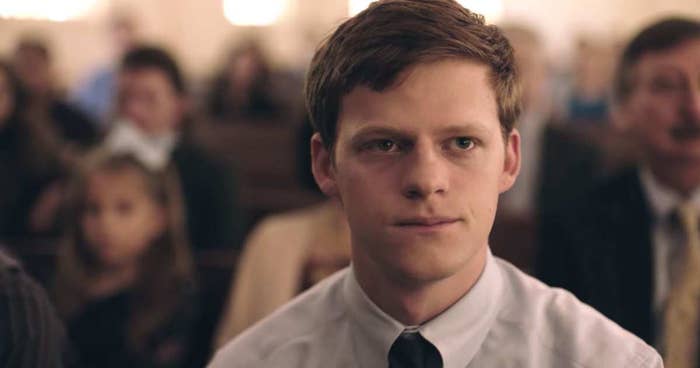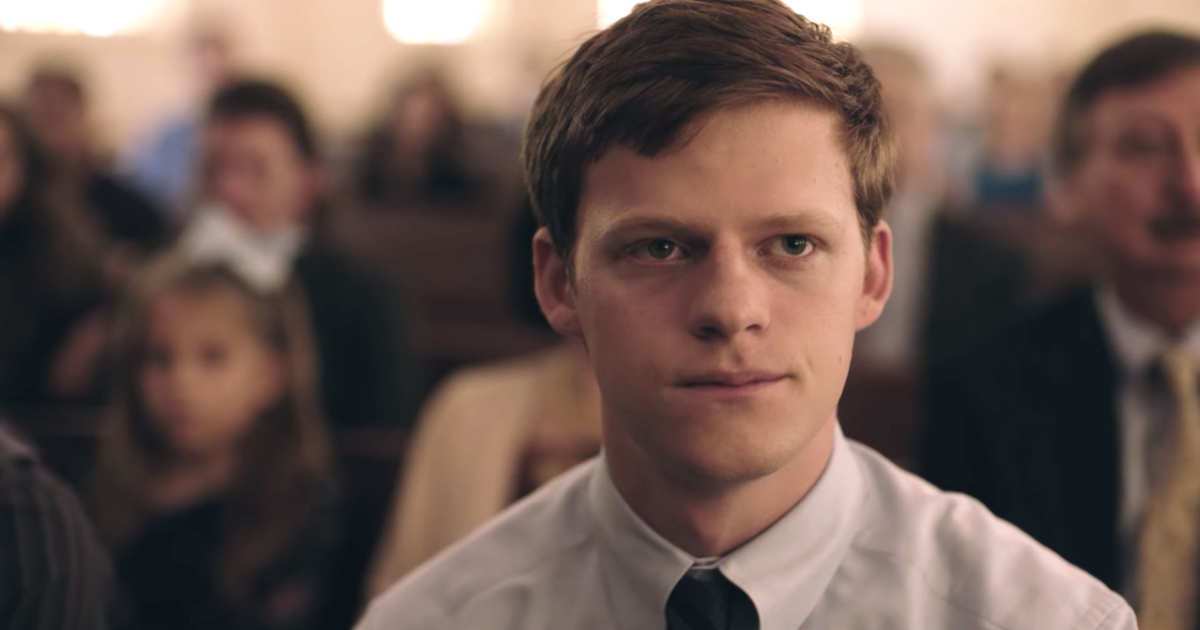
Only a year like 2018 can give us not one, but two notable movies about gay conversion therapy. On one hand, it’s easy to feel exhausted consuming even more media about vulnerable minorities being mistreated in this calendar year. On the other hand, it’s exciting to see what are hopefully well-made dissections of a horrible, still very much widespread practice. Both The Miseducation of Cameron Post and Boy Erased are period pieces about this very subject, but only one is a meaningful and nuanced dive into this complicated topic.
Boy Erased is the flashier of the two, with its wide release and star-studded cast. Written and directed by Joel Edgerton and based on Garrard Conley’s memoir of the same name, Boy Erased follows a young gay man named Jared (Lucas Hedges) who, after being outed by a college friend, is enrolled in conversion therapy in the early 2000s by his priest father (Russell Crowe) and similarly religious mother (Nicole Kidman). In addition to directing and writing, Edgerton also portrays Victor Sykes, the head coordinator of the Love In Action ex-gay program.
Sykes is cartoonishly evil, with no clear characterization beyond “Bible-thumping homophobe”; the movie mostly portrays Sykes spouting vague religious ideas, and lets the (ostensibly liberal) audience fill in the blanks. The Love In Action participants, including Jared, are also underdeveloped. The movie neglects to explore Jared’s relationship with Christianity, even though he is the son of a priest. Xavier Dolan’s character, Jon, similarly isn’t defined much beyond his military service and his strong belief in the program. Troye Sivan makes the most of his supporting role as a fellow participant using the program’s “fake it ‘til you make it” ethos as a form of survival, and imploring Jared to do the same. The character feels lived in, which is a great testament to Sivan’s acting, but a slight to a main character like Jared, who presumably should feel the most developed.
Fortunately, the film affords Jared’s parents very specific dramatic arcs, in emotional scenes where we check in on the state of their relationship with their son before, during, and after his stint in the program. One of the film’s most powerful scenes is Jared’s tearful reconciliation with his mother and difficult confrontation with his father after being removed from the program. Again, the development of these characters is important, but becomes disappointing when contrasted with Jared’s two-dimensional characterization. This lack of nuance makes for a film that seemingly wants to make an impactful statement about homophobia, but mostly paints a myopic picture of Christians and is overall frustratingly insular and vague.
The film’s biggest misstep, and one that fully encompasses its lack of nuance, is how it handles Jared’s sexual assault. Early in the film, Jared is raped at college by his friend Henry (Joe Alwyn), who eventually outs him to his parents, leading to his enrollment in Love In Action. Jared’s rape scene is needlessly explicit, captured in a single medium shot that seems to go on forever; astonishingly (and horrifically), this is the only scene of male on male sexuality in the entire movie. Edgerton never explores Jared’s trauma, save for one scene in which Sykes references the incident in a bid to get Jared to make a “confession” about his sexuality. Unfortunately, Jared promptly changes the subject, a missed opportunity for the film to explore the intersection between rape culture and homophobia, as well as how Jared has processed this trauma. This is especially appalling since the memoir itself explores this topic in depth, with Conley writing that “it was extremely difficult after [his] experience to consider gay sex as anything other than rape.” All of these weaknesses make Boy Erased a movie that fails to meaningfully reckon with the emotional trauma of its central character, or any other character directly harmed by conversion therapy.
Where Boy Erased fails to explore the trauma of its characters, The Miseducation of Cameron Post explores it in searing fashion, placing the titular Cameron (Chloë Grace-Moretz) and her friends in the foreground. The film is based on the young adult novel of the same name (which coincidentally was inspired by a real life incident involving Love In Action), and follows a teenage girl as she’s sent to a conversion therapy camp by her conservative aunt in the early 1990s.
Cameron Post has empathy for every single one of its characters, but not always sympathy. It portrays conversion therapy camp as a jail, not only for its participants but for the coordinators as well, and paints their struggles with intermittent strains of harrowing drama and black comedy. Cameron befriends fellow participants Jane Fonda (Sasha Lane), a lesbian raised in a hippie commune, Adam Red Eagle (Forrest Goodluck), a Lakota two-spirit whose father has converted to Christianity, and several other characters whose various backgrounds and attitudes towards conversion therapy are quickly and effectively sketched in. The film carefully describes the participants’ relationships with their parents in devastating fashion, eliciting sympathy for them. This nuance directly informs the camp participants, and makes them feel real beyond their suffering.
While Cameron and her friends find gallows humor in their predicament, the movie never loses sight of how damaging homophobia can be, in all its forms. This is primarily communicated through a career-best performance by Moretz. Cameron’s humiliating outing by a boyfriend at prom is viscerally felt in a seemingly never-ending closeup on her despondent face. Another especially heartbreaking scene finds coordinator Dr. Lydia Marsh (Jennifer Ehle) telling Cameron that the first step is to stop thinking of herself as a homosexual, to which Cameron responds, “I don’t think of myself as much of anything.”
The film doesn’t paint the camp facilitators with broad strokes, like Boy Erased does with Victor Sykes, but instead goes for a more specific characterization, detailing the perverse allure that conversion therapy can have in a punishingly homophobic world. The movie empathizes with these characters, who legitimately believe that they are helping these children. Dr. Marsh runs the camp with her brother, Reverend Rick (John Gallagher Jr.), who alleges to have been “cured” of his homosexuality with the help of his sister. The film affords Dr. Marsh empathy, as she clearly believes that she “helped” her brother and wants to “help” others. But she does not receive the sympathy afforded to Cameron and her friends; that’s reserved for her brother.
Reverend Rick is the tragic center of this movie, battling internalized homophobia, which is constantly reinforced by the sincere, yet horribly misguided love of his sister. It’s clear to both the audience and camp participants that his suffering is similar to that of the participants themselves, and that he represents a possible future they could face—hiding his pain behind a carefully constructed mask that could break at any minute. Compare Cameron Post’s willingness to untangle the internalized struggle within Reverend Rick with Boy Erased, which refuses to engage with Victor Sykes on any level beyond his status as a villain. A one sentence, text-based epilogue, which reveals that Sykes later left Love In Action and now lives with his husband, was met with laughter from the audience I saw it with.
The Miseducation of Cameron Post portrays the complicated feelings and contradictions behind those who facilitate and participate in conversion therapy. Boy Erased takes a ham-fisted approach, without any consideration for the complications of a homophobic society, and ends up reading like a Wikipedia article on the topic. Still, that might simply be because the movies have different, well-intentioned aims. Boy Erased, with its prestige drama veneer and Academy Award mainstays Nicole Kidman and Russell Crowe (who both give great performances), is targeted to a mainstream (read: straight) audience, and therefore primarily aims to be histrionic and create a renewed dialogue about this abuse that’s still legal in 36 states, while winning a few awards along the way. The Miseducation of Cameron Post, with its lesser-known actors and limited release, is targeted to queer audiences who will likely seek it out for themselves, and will appreciate a more complex story about abuse and queer resilience that doesn’t give any easy answers.
The most stark example of their differences may be found in each movie’s ending: Boy Erased ends with our protagonist finally free to be who he is, years into the future, in an uncomplicated happy ending. The Miseducation of Cameron Post ends with our protagonists escaping the camp in their present and heading towards an unknown, most likely dangerous future. They’re different stories, and that’s fine; it’s just a shame that we still don’t trust mainstream audiences with more nuanced portrayals of this harrowing topic.

